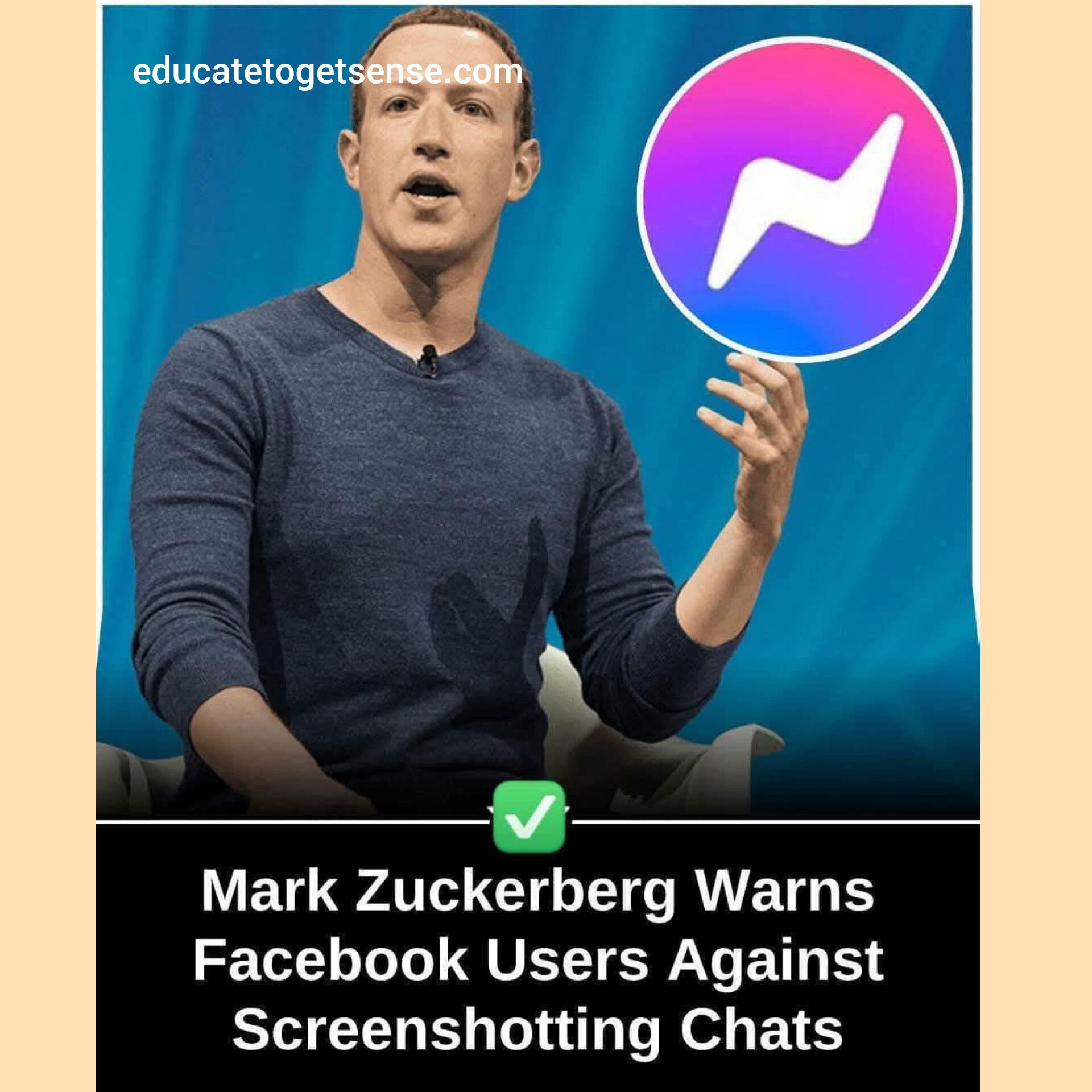NEWS FLASH! MARK ZUCKERBERG ISSUES URGENT WARNING TO FACEBOOK AND INSTAGRAM USERS: AVOID SCREENSHOTS OF PRIVATE CHATS TO PROTECT YOUR PRIVACY AND SECURITY

In a significant announcement that reverberated through the digital landscape, Mark Zuckerberg, the visionary CEO of Meta Platforms, Inc., has delivered a stern and direct warning to the vast global user base of Facebook and Instagram. His message is unequivocally clear: users should actively avoid taking screenshots of their private chat conversations.
This seemingly innocuous act, often performed casually and without a second thought, carries substantial implications for individual privacy and overall digital security, an area where Meta is increasingly dedicating significant resources and strategic focus.
Zuckerberg's statement underscores a critical distinction that many users might overlook: while the act of messaging on platforms like Facebook Messenger and Instagram Direct may feel inherently informal, spontaneous, and even ephemeral, the underlying reality is that these conversations, despite their casual nature, often contain sensitive and personal information.
The casual ease with which one can capture a screenshot belies the serious privacy ramifications that can ensue when such an image falls into the wrong hands or is inadvertently shared beyond its intended audience.This timely reminder from the Meta CEO is not an isolated incident but rather a crucial component of a broader, more aggressive corporate strategy to fortify user data protection and shield sensitive dialogues from unintended exposure and potential misuse.
In an era where data breaches, privacy concerns, and the weaponization of personal information have become front-page news, Meta is evidently striving to re-establish and reinforce trust with its billions of users by emphasizing robust security protocols and educating them on best practices for maintaining their digital privacy.The very act of taking a screenshot fundamentally alters the nature of a private conversation. What was once confined to a secure, encrypted digital channel between two or more parties instantly becomes a static image file, potentially residing on a device's photo gallery, cloud storage, or even being shared with others outside the original chat.
This transformation from dynamic, controlled communication to a shareable, static artifact significantly increases the surface area for privacy breaches. Once a screenshot is taken, the original controls and protections inherent in the messaging platform, such as ephemeral messages or unsend options, are circumvented. The image becomes a standalone piece of data, subject to the security vulnerabilities of the device it's stored on, the applications it might be shared through, and the discretion of the individual who captured it.Consider the common scenarios: a user might screenshot a funny message to share with a friend, capture an important detail from a conversation for later reference, or even document a dispute. While these intentions might seem harmless, the potential for unintended consequences is vast.
A device could be lost or stolen, granting unauthorized access to these private images. A screenshot intended for one person might accidentally be sent to another. In more malicious scenarios, individuals might deliberately capture and disseminate private conversations to harass, blackmail, or otherwise exploit others.Zuckerberg's warning implicitly highlights the "expectation of privacy" that users have when engaging in private chats. When you send a message, you typically expect that message to remain within the confines of that specific conversation.
A screenshot shatters this expectation, allowing the content to escape its intended boundary without the original sender's knowledge or consent. This erosion of trust can have chilling effects on open communication and honest dialogue within digital spaces. If users constantly fear that their words might be captured and used against them, it stifles genuine interaction.Meta's renewed emphasis on safeguarding user data is a direct response to a landscape increasingly dominated by regulatory scrutiny, public demand for greater data control, and a heightened awareness of digital ethics.
The company has invested heavily in end-to-end encryption for Messenger and other features designed to enhance privacy. However, these technological safeguards can only go so far if user behavior inadvertently creates new vulnerabilities. Zuckerberg's warning, therefore, serves as a vital educational piece, empowering users to be active participants in their own digital security.
Furthermore, the warning isn't just about preventing malicious intent; it's also about preventing accidental exposures. In a world saturated with digital content and rapid sharing, it's all too easy to mistakenly upload a screenshot to a public social media feed, share it in the wrong group chat, or even have it inadvertently displayed during a screen-sharing session. These accidents, though unintentional, can have profound and lasting consequences, ranging from personal embarrassment to professional repercussions or even legal issues, depending on the nature of the content.
The broader implication of Zuckerberg's statement is a call for greater digital literacy and mindfulness among users. In an interconnected world, the line between public and private is often blurred, and the ease of digital actions can sometimes obscure their real-world impact. By highlighting the seemingly simple act of taking a screenshot, Meta is pushing users to think more critically about how they interact with digital content and the inherent responsibilities that come with digital communication.In conclusion, Mark Zuckerberg's unequivocal warning against screenshotting private chats on Facebook and Instagram is a critical directive in the ongoing effort to fortify user privacy and security across Meta's vast ecosystem. It serves as a powerful reminder that the casual nature of digital messaging does not negate the importance of protecting sensitive information.
By urging users to exercise caution and avoid this seemingly innocuous act, Meta is not only reinforcing its commitment to safeguarding user data but also empowering individuals to take a more active role in protecting their own digital footprint from unintended exposure and potential compromise. As digital communication continues to evolve, this emphasis on responsible user behavior will remain paramount in ensuring a secure and trustworthy online environment.